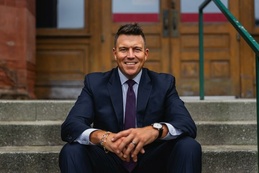A Wildfire Summer
Guest Opinion
By Lauren Teichner | June 21, 2025
I’m a mom, a camping enthusiast, and an environmental attorney, and in the past few years, these roles have intersected in painful ways. Like so many Michiganders, my family treasures summer camping. Blue skies, leafy green forests, s’mores, and sleeping under the stars. To us, camping is not just recreation; it’s how we restore, connect, and teach our kids what it means to belong to a natural place.
But now, each trip begins with checking the air quality index before we load up our van. Wildfire smoke is changing the way we live—not just in places like California, but right here, in northern Michigan. And I’m not willing to pretend that’s normal.
Already, in early June 2025, smoke from over 200 Canadian wildfires drifted into northern Michigan. AQI levels reached “unhealthy” to “very unhealthy” (150-250+) in areas including Benzie County, Leelanau County, and parts of the Upper Peninsula. All residents across those regions, not just those with sensitive lungs, were advised to limit outdoor activity. In Marquette, smoke reduced visibility so dramatically that downtown was barely visible in photos. Many still recall the Canadian wildfires of 2023, which created some of the worst air quality conditions in recorded human history—including here in our region.
Thankfully, scientists predict that wildfire smoke this summer may not be as severe. But even so, monitoring AQI projections has become routine for families like mine, and essential for deciding whether it is safe enough to take our kids on the camping trips we love.
As much as we might not want to face it, there is no escaping the truth: Our beloved summer traditions are colliding head-on with the climate crisis. We must draw a direct line between forest fires and human-driven climate change, and then shout that truth from our camper van rooftops.
This smoke is not just an inconvenience; it is a symptom of a growing global pattern. Canada’s wildfire seasons are becoming longer, more intense, and more destructive, fueled by warmer temperatures and drier air conditions directly linked to carbon emissions from burning fossil fuels (like coal, oil, and gas) for electricity, transportation, industry, and heating. These emissions have heated up the Earth’s atmosphere and raised the risk of extreme weather events.
What was once only an inconvenient backdrop to our summer adventures has now become a painful reminder of the urgent need for climate action.
At the time of this writing, Congress is still debating the terms of Trump’s budget reconciliation bill, which—among other atrocities—directly attacks our natural resources and healthy future. It mandates the sale of public lands, cuts funding for those who care for them, and slashes our hard-fought clean energy initiatives that are critical to curbing climate change and its impacts, including wildfires.
The proposed bill would drive up energy bills for Michiganders, eliminate hundreds of thousands of clean-energy jobs, and prop up a dying fossil fuel industry. All at the very moment when we should be sprinting in the opposite direction.
If we think the air quality is bad now, just wait: This legislation would gut vehicle and methane emissions standards and even cut air pollution monitoring programs in schools, not to mention eliminate funding for the scientists who research air quality.
And yet, there is still hope. A YouGov study earlier this year found that 66 percent of voters now believe climate change is happening, and 76 percent of voters believe it is very or somewhat likely that climate change is worsening weather events.
We stand at the tipping point of transforming how we live to support a sustainable future. What’s needed to move the needle—locally, statewide, and nationally—is not a majority, but a small, active percentage of the population willing to speak up. Research suggests that even 3.5 percent of engaged citizens can be enough to spark meaningful political change.
That’s where we come in. Like my own family, if you have spent one of the 1.16 million camping nights logged in Michigan’s state parks and recreation areas in 2024, you already have a personal stake in what’s at risk, and a powerful story to tell.
Call your representatives in Congress—every few days if you’re up to it—sharing your camping experiences and demanding that your elected leaders protect our climate and public lands. (Always say you’re a constituent and include at least your zip code, so staff can tally your call.) Politicians rely on voter support, and your calls, voicemails, and emails hold them accountable; their positions can be moved by the personal stories of their constituents.
During the summer camping season, we rely on fresh air to fill our lungs, give us energy to play, help us sleep deeply in our tents, and restore our minds as we wake up to bird-song-filled mornings at the campsite. Every breath is a gift from the trees around us. Let’s use our love for these places to ground and guide our advocacy. Let’s demand that our leaders act now to defend our planet, so that we and generations to come can continue to breathe deeply and find joy in Michigan’s great outdoors.
Lauren Teichner is the founder and principal attorney at Teichner Law, a public interest environmental law firm based in Traverse City.
Trending

Anxiety, Screens, and Self-Esteem
If adulting feels hard sometimes, let it be a reminder that growing up can be, too. Data from the National Alliance on Ment… Read More >>
Gaming That’s Out of This World
Anyone with an appreciation for the late 1970s and 1980s might enjoy the sound of vintage video games and their incredible l… Read More >>
Finding True North
For most, the next step after graduating from law school and passing the bar exam is to join an established law firm. That&r… Read More >>


